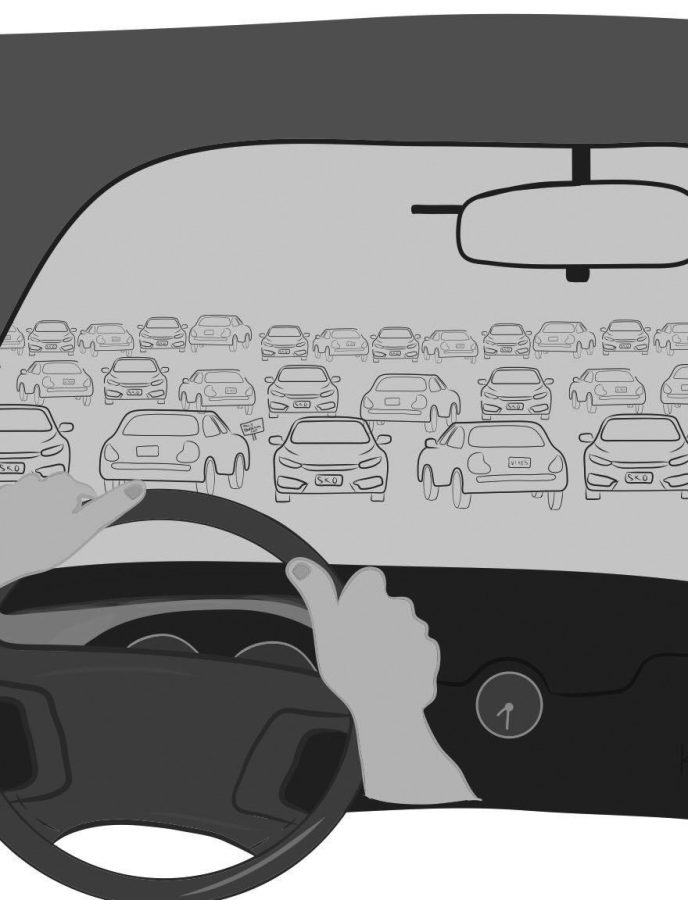Senior Ashutosh Bhown circles the parking lot, eyes scanning for a strip of open space — but there are no open spots in sight. The bright pink glare of guest parking permits sitting on the dashes of dozens of cars momentarily catches his eye as he shifts to searching for street parking, only to see that it is full. The time is 12:09 p.m., and his stomach sinks as he realizes he will have to walk into fifth period late.
Bhown is one of the dozens of students with parking permits, which cost $100 for the entire year, who are sometimes hard-pressed to find parking on campus. According to a poll conducted this year, when The Campanile surveyed 70 juniors and seniors through a Google Form distributed on social media, 72 % of student permit holders have been unable to find parking on campus at least once.
With no choice but to find parking off campus, students must turn to El Camino Real or nearby residential streets for a parking spot — additionally, students are not allowed to park in the Southgate neighborhood by Churchill Avenue, which limits options even further.
These students spend valuable time looking for a place to park, which can result in them coming to class late — according to the same poll, nearly 60 % of the upperclassmen with parking permits are late to class at least once a week because they cannot find parking. Of those students, nearly 18 % are late three to four times a week. According to Main Office Secretary Jennifer Gardiner, students come into the office with parking issues at least once every two or three weeks.
Being habitually late to classes interferes with teaching and disrupts the entire class’s learning — finding parking clearly contributes greatly to this problem, and there are many simple solutions that would help alleviate these issues. If the enforcement schedule were randomized, the staff parked in staff-only spots, and the guest parking permit system were modified, the number of tardy students would decrease and those who bought permits would be able to consistently find parking.
Paly’s parking is currently enforced by the Palo Alto Police Department (PAPD). According to Gardiner, each lot is checked one to two times per day, and any vehicles without valid permits in plain view are ticketed and fined a minimum of $46.
However, the PAPD never does checks after their daily lunchtime check — many students without permits take advantage of this by moving their cars out of the lot at the beginning of lunch, then re-parking after lunch.
To help combat students working around PAPD’s enforcement, PAPD ought to randomize the times each lot is checked — a main reason that students without permits decide to park on campus is that they know they will not be ticketed during certain times, and creating an internal rotation or randomization of enforcement times eliminates that guarantee, thus decreasing the number of spots taken up by students without permits.
According to senior Alex Daw, who drives to school every day, another issue that makes finding parking even more difficult for students is that staff members occasionally park in student spots. Staff are permitted to park in any spot — however, according to Daw, some staff members park in student sections when staff-only spots are still available. Daw said some mornings he spends around 10 minutes trying to find spots in the on-campus lots and occasionally has to park outside his friends’ houses or along nearby streets.
The guest permit system also perpetuates parking difficulties on campus. According to Gardiner, 25 to 100 one-day guest permits are typically issued every day — on rainy days or during campus events, that number, along with the number of students who come to Gardiner with parking issues, tends to increase.
These permits can be obtained relatively easily — guests sign in at the front office, and Gardiner hand-writes them a permit. However, there is no limit to how many guest permits can be given, and every time Gardiner writes a permit, a spot could be taken away from a student or staff member with a permit.
There is a limited number of parking spots on campus, and even fewer are available to students — if guest permits are issued with no regulation, there is nothing to stop spots from simply being “oversold.”
The way to fix this issue and prevent student spots from being taken is to regulate the number of guest permits issued on any given day. The number of student permits, staff permits and possible guest permit ought to add up to the total number of spots — that way, the possibility of giving too many guest permits and taking away student spots is eliminated.
Students who purchase permits ought to always have a place to park on campus, no matter the weather or what events may be going on.
Spreading awareness about staff parking in student spots, as well as randomizing the times that parking enforcement checks the lots and modifying the guest parking permit system, would help diminish the issues that surround parking on campus and lessen the number of students who are routinely tardy.

